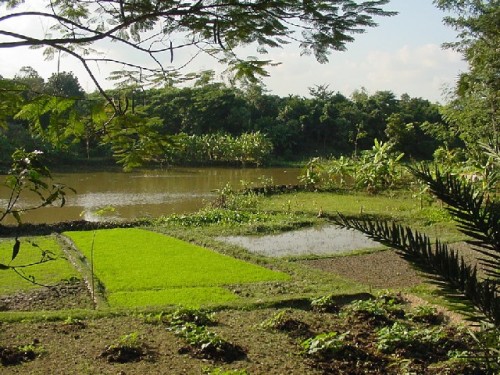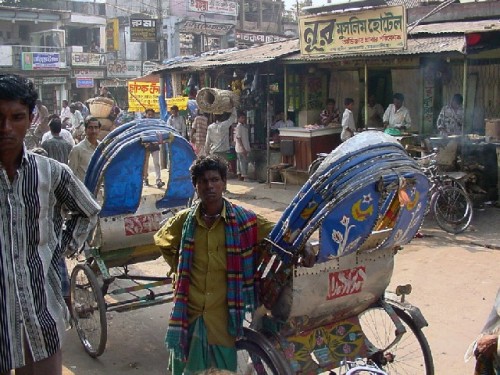The Bookseller of Dhaka
A Tale from Bangaladesh
By: Michael Bedford - Apr 20, 2011
Rain swept across the patio, flowing almost parallel to the ground. Coconut palms on the perimeter severely whipped in the heavy winds. The South Asian nation of Bangladesh was leaving the season of grisma and entering barsa, the monsoon season. Grisma is a difficult season, between the dry coolness of December to February and the heat and flooding monsoon rains starting in June. In grisma, Bangladesh experiences increasingly drought conditions – ironic of a nation of the world’s largest river delta and a reputation for massive floods. Rivers and streams dry up and become navigational nightmares. .
The arrival of monsoons is welcome, drawing cooler air, heavy rains and strong winds off the Bay of Bengal. Bangladesh quickly transform back into a land of water, with some of the largest river systems in the world overflowing banks, driving millions of people from their homes. Raindrops fall heavy, splashing up the dry dust coated on tree leaves. The monsoon wind bends palms and fruit trees outside our window, and bamboo sways in turbulent patterns. Darkness of the heavy rain clouds make the sun a distant memory, as the rains continues for days on end. The air hung portent with expectation.
We were sitting down to dinner amidst the pounding of rain outside, when the gate bell rang. Bells rarely ring at night in Dhaka, and when they do, they often offer some unexpectedly delightful event. Quickly, our house guard knocked on our door and breathlessly announced, “Mr. Nasam” was here to meet with us. I had indeed heard of this strange man from others who had lived in Dhaka. They told us of how Mr. Nasam arrived at your door without notice, often at the most inopportune time. He would present himself with such a sweet firm demeanor, one was hesitant to turn him away. He had no telephone; he just arrives with his collection of books.
Curious, my wife Sarah went out to the gate and found a small graying man with a warm smile. Mr. Nasam greeted her in quite fluent English, saying our friends Dee and Victoria had sent him to us. Mr. Nasam is a very enthusiastic bookseller, whose clients are expatriates living on the outskirts of Dhaka. He proudly announced that he had come to show us his book collection. He arrived on a bicycle rickshaw, peddled by another thin graying man, one of the tens of thousands of poor rural men who carry people and goods around the city for ten hours or more every day. The rickshaw body was covered with fantasy paintings of tigers, rivers, and Indian movie poster scenes. The passenger seat was piled up over three feet high with boxes of books, and on top of this mountain of book boxes, Mr. Nasam sat, soaked thoroughly by the rains. The driver, or wallah, was wrapped in an old shawl to keep the rain off his face and wore only a long plaid longi cloth around his hips.
After climbing down and removing his shoes at our door, Mr. Nasam slowly and formally introduced himself and asked if we wished to peruse his collection of books. We eagerly nodded yes, as books never have a problem entering our lives but are major problem leaving. The rickshaw wallah followed Mr. Nasam into our living room with box after box carefully wrapped in plastic, placing them on the floor of our living room. Inside each box were hardbound books individually wrapped lovingly in more plastic; books about various topics and especially on South Asian politics, art , and economics. We sat expectantly as he slowly unwrapped each book as if a long lost treasure, passing each carefully as a jewel for us to look at. Indian architecture was especially fascinating and we gazed lovingly over one rich [and costly] book about applying this particular and intriguing South Asian style to designing work and living spaces. With time in Dhaka to reflect and dream, such books feed our free-floating fantasies.
Using restraint, I purchased only one book and Sarah emerged empty-handed, but Mr. Nasam knew he had hooked a new captive audience. I asked for South Asian cookbooks on his next visit, and South Asian politics. Sarah requested books on Hindu art and architecture. Next time, he promised. He has a reputation of identifying “likely” suspects and would return again and again on rickshaw, unannounced to present new offerings. After almost two hours, our dinner now cold, Mr. Nasam and the rickshaw wallah disappeared into the dark rainy night.
Mr. Nasam’s importance to our lives can be understood by noting Bangladesh has an abysmally low literacy rate. UNESCO figures in 2000 place over 55% of the Bangladeshi population as illiterate, with an astonishing 64% of adult females unable to read. There are 6 newspapers per 1,000 citizens, compared to 218 per 1,000 citizens in the United States. Few bookstores exist outside of universities, and almost no English language books.
Added to this fact was that it was very difficult to order books online from web-based sellers. To gain an internet connection in Dhaka required on average ten dial-up attempts, using a list of seven access numbers that inevitably were busy. Connections unexpectedly cut off, making leisure time searching for books virtually impossible. If we able to finally order online books, packages arrived via diplomatic pouch many weeks later. After September 11th and the anthrax scares that affected US Embassies around the world, our mail became delayed three months or even more. When books finally arrived, packages were irradiated and the pages fried into a crisp brown.
Mr. Nasam returned to our home many times over the following two years. We lingered long over tea and learned of his personal history and the 1970 War of Liberation that brought Bangladesh into being. We bought many many books from this small sparkling man. Memories of Mr. Nasam have lingered long after our return to the United States, as we have reflected on how strange, special, and beautiful living in a remote South Asian country was. Bangladesh is a place where a quiet bookseller could arrive unannounced at our gate, amidst a torrential monsoon downpour on an overloaded rickshaw. Mr. Nasam later brought us gifts – a watermelon, mangoes when in season, and star fruit. What he brought us was most importantly a connection between buyer and seller, between Bangladeshis and Americans that transcended larger troubling political events. Mr. Nasam joined us in a deep respect and love of books that crossed borders.



